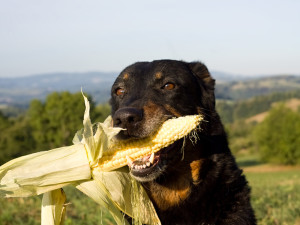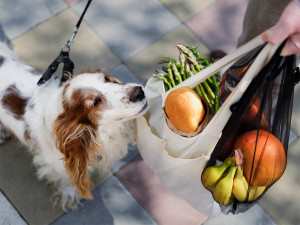Can Dogs Eat Tuna?
It’s a kitty favorite, but your dog can have a bite, too.

Share Article
Tuna is a safe treat to feed your dog in small quantities, but you may want to be careful if you’re making it a part of their regular rotation. Read along for some helpful information on treating your pet to some “chicken of the sea.”
Nutrition facts of tuna
Yes, dogs can eat tuna. It’s stinky, it’s packed with protein and omega-3 fatty acidsopens in a new tab, it’s affordable — what’s not to love? Although tuna is safe to feed in moderation, there are a couple of considerations before feeding your dog tuna, especially from a can.

littleKin™ is Kinship’s home just for puppy and kitten parents. Bop over to check out expert advice, new pet tools, and special deals—all curated for your newest family member.
opens in a new tabIs tuna good for dogs?
Tuna is an excellent source of protein and essential nutrients like omega-3 fatty acidsopens in a new tab, which can be great for your dog’s skin, coat, joints and organ health. If using canned tuna, you should make sure it is packed in water, not oil, as oil-packed tuna can be high in fat and may upset your dog’s stomach. It is also recommended that you stick with plain tuna and avoid spices or seasoning. While tuna can be a tasty treat for your dog, it should only be used to supplement a balanced diet and not their main staple food, to avoid any nutritional deficiencies.
Is tuna completely safe for dogs?
Although tuna is technically safe to feed, it is recommended that you only feed it as an occasional treat, and not as your dog’s main source of nutrition. When feeding tuna, especially out of a can, stick to tuna packed in water and not oil, as excessive amounts of fat in oil can cause gastrointestinal upset, such as vomiting and diarrhea. This is especially true for dogs that are prone to pancreatitis.
Also note, tuna can contain mercury (especially albacore tuna), so excessive amounts of tuna can lead to mercury poisoning over time. Sticking to small or infrequent servings can reduce this risk. Lastly, canned tuna can contain added salt, which could be harmful in large quantities, especially in dogs with pre-existing heart disease. Look for low-sodium or no added salt varieties.
Other fruits/veggies/fruits that are good/safe for dogs:
Certain fruits, such as strawberriesopens in a new tab, blueberriesopens in a new tab, apples opens in a new taband watermelonopens in a new tab are great treats for your dog, especially on a hot day. Berries are rich in antioxidants, vitamins, and fiber, which can support your pup’s overall health. Remember to avoid the core and pits of apples and other fruit, and try to avoid feeding excessively, as some fruit can contain a lot of sugar.
String beans, carrotsopens in a new tab, sweet potatoesopens in a new tab, and pumpkinopens in a new tab are low-calorie snacks and great sources of fiber and vitamins A and C. These can be great treat options for dogs who need to maintain a healthy weight but still want to “indulge” occasionally. These can be used to create homemade treats, especially in dogs with food sensitivities who cannot tolerate certain proteins. And as always, it is best to remove seeds, pits, or stems and avoid seasoning with salt, spices, or other seasonings.
Lean meats, such as chicken, beef, and salmon can be a great treat for your dog, if they can tolerate it. Try to keep it as plain as possible, and stick to leaner options, like chicken breast and lean ground beef. It is best to remove any skin and bones, and introduce slowly and in small amounts.
Other fruits/veggies/foods that are dangerous for dogs:
Grapes and raisinsopens in a new tab can be toxic to dogs, even in small quantities. The toxic part of the grape is not known, so it is best to keep out of reach altogether. If your dog has ingested grapes or raisins, it is important to get them to a veterinarian as soon as possible, and ideally contact a pet poison center, such as the ASPCA Poison Control, while you are en route.
Garlic and onions can be toxicopens in a new tab in higher amounts in dogs. This includes all forms, such as fresh, powdered, and in seasonings in various foods. It is important to keep these away from your dog, and check the ingredients of any products you are feeding your dog for onions and garlic.
Raw meats pose health risks to dogs, just like they do in people. Not only that, but when your dog licks your face, they can transfer harmful bacteria to you, causing you to be sick as well! This is especially dangerous with young children, elderly, pregnant, or immunocompromised people. If you feed your dog a raw dietopens in a new tab, take precautions to keep everyone safe and healthy.
The bottom line: Can dogs eat tuna?:
Yes! Dogs can enjoy tuna once in a while. It is best to stick to tuna packed in water and avoid seasonings or salt-added varieties. Although tuna is not toxic, it should not be fed in large quantities or be your dog’s only source of nutrition. As always, before introducing any new food to your dog’s diet, it is best to consult with your veterinarian.
FAQs (People also ask):
How much tuna can a dog eat?
It’s best to stick to small amounts of tuna fed as a treat, and not to make it your dog’s regular diet or only source of nutrients.
Is it OK to give dogs tuna?
Yes! It is perfectly fine to give your dog tuna as a snack. We would stick to tuna packed in water and avoid oils or salts if possible, as this may cause gastrointestinal upset or additional health problems
Why do dogs like tuna?
Tuna is stinky, which makes it irresistible to many dogs (and cats!). It can be used as a topper on your dog’s food or as an occasional treat.
Can dogs eat tuna?
Yes, tuna is not toxic to dogs. However, it is recommended to only feed in small amounts as a treat, and stick to tuna packed in water, not oil.
Is tuna good for dogs?
Tuna is a low-calorie food packed with protein and omega-3s. It is recommended to feed tuna in small amounts, and in addition to a balanced diet.
Is tuna safe for dogs?
Yes, although tuna is safe to feed your dog, we recommend feeding tuna packed in water not oil, and avoiding seasonings or salt if at all possible.

Dr. Gabrielle Fadl, DVM
After graduating from Kansas State University College of Veterinary Medicine, Dr. Fadl returned to the New York area to pursue a one-year rotating internship and has been working in general practice since. Dr. Fadl loves working in the pet space to foster the powerful human-animal bond. She hopes to continually learn and grow to practice the best quality medicine. Her motto is “Keep calm and try to take it as it comes.”
Related articles
![A woman feeds her dog with a piece of fries during lunch.]() opens in a new tab
opens in a new tabCan Dogs Eat Potatoes?
We know they are your adorable little potato, but can they snack on one?
- opens in a new tab
Can Dogs Eat Chocolate?
No isn’t a strong enough answer here. Learn why.
- opens in a new tab
Can Dogs Eat Onions?
Add them to the list of no-nos in the kitchen. Here’s why.
- opens in a new tab
Can Dogs Eat Asparagus?
Asparagus is a healthy snack for pups, but keep these tips in mind.
![Woman in the kitchen with her dog.]() opens in a new tab
opens in a new tabCan Dogs Eat Persimmons?
There are some caveats to be aware of.
- opens in a new tab
Can Dogs Eat Celery?
Sure, they can have a bite—if they want one.







